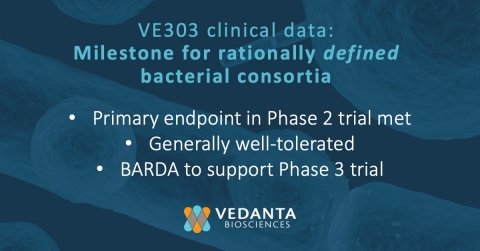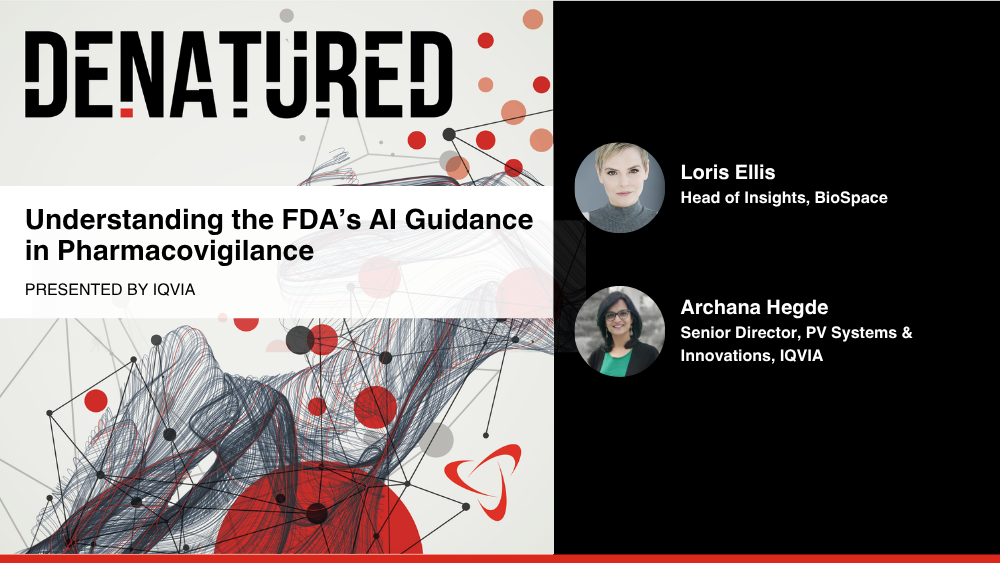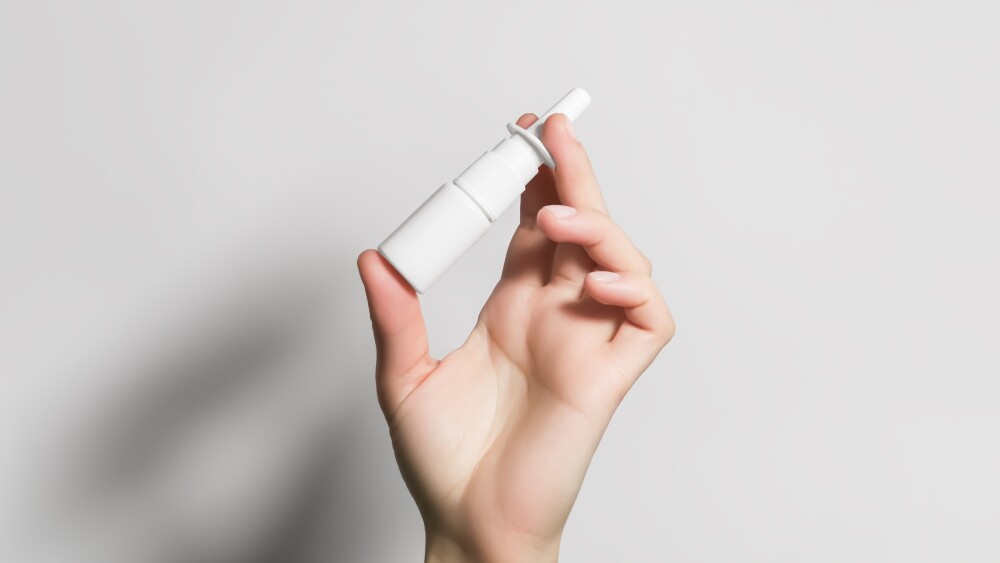PureTech Health plc (Nasdaq: PRTC, LSE: PRTC) (“PureTech” or the “Company”), is pleased to note that its Founded Entity, Vedanta Biosciences (“Vedanta”) today announced that its Phase 2 clinical trial of VE303.
High-dose VE303 in Phase 2 trial achieved primary endpoint, with 31.7% absolute risk reduction in rate of recurrence (or a greater than 80% reduction in the odds of a recurrence) at 8 weeks when compared with placebo
Represents most advanced clinical trial of a rationally defined bacterial consortium candidate
BARDA exercises $23.8 million option to support Phase 3 clinical trial of VE303, to initiate in 2022
BOSTON--(BUSINESS WIRE)-- PureTech Health plc (Nasdaq: PRTC, LSE: PRTC) (“PureTech” or the “Company”), a clinical-stage biotherapeutics company, is pleased to note that its Founded Entity, Vedanta Biosciences (“Vedanta”) today announced that its Phase 2 clinical trial of VE303, an orally administered investigational live biotherapeutic product in development for the prevention of recurrent C. difficile infection (CDI) in high-risk patients, met its primary endpoint of preventing disease recurrence through Week 8. VE303 achieved a 31.7 percent absolute risk reduction in rate of recurrence when compared with placebo, representing a greater than 80 percent reduction in the odds of a recurrence. This is the most advanced clinical trial of an investigational drug based on a rationally defined bacterial consortium, a microbiome-based therapeutic approach that delivers orally administered candidates of precisely known composition that can be manufactured with pharmaceutical-grade consistency.
This press release features multimedia. View the full release here: https://www.businesswire.com/news/home/20211005005154/en/

PureTech Founded Entity, Vedanta Biosciences, announced today that its Phase 2 clinical trial of VE303, an orally administered investigational live biotherapeutic product in development for the prevention of recurrent C. difficile infection (#CDI) in high-risk patients, met its primary endpoint of preventing disease recurrence through Week 8. VE303 achieved a 31.7% absolute risk reduction in rate of recurrence when compared with placebo, representing a greater than 80% reduction in the odds of a recurrence. (Photo: Business Wire)
Based on the Phase 2 data, the Biomedical Advanced Research and Development Authority (BARDA) has exercised its first contract option for additional funding of $23.8 million, pursuant to its existing 2020 contract with Vedanta, to support the Phase 3 clinical trial of VE303, which Vedanta plans to initiate in 2022.
The full text of the announcement from Vedanta is as follows:
Vedanta Announces Positive Topline Phase 2 Data for VE303 in High-Risk C. difficile Infection and Exercise of $23.8 Million Option by BARDA
High-dose VE303 in Phase 2 trial achieved primary endpoint, with 31.7% absolute risk reduction in rate of recurrence (or a greater than 80% reduction in the odds of a recurrence) at 8 weeks when compared with placebo
Represents most advanced clinical trial of a rationally defined bacterial consortium candidate
BARDA exercises $23.8 million option to support Phase 3 clinical trial of VE303, to initiate in 2022
CAMBRIDGE, MA – Vedanta Biosciences, a clinical-stage company that is developing a potential new category of oral therapies based on defined bacterial consortia, today announced that its Phase 2 clinical trial of VE303, an orally administered investigational live biotherapeutic product in development for the prevention of recurrent C. difficile infection (CDI) in high-risk patients, met its primary endpoint of preventing disease recurrence through Week 8.
VE303 achieved a 31.7 percent absolute risk reduction in rate of recurrence when compared with placebo, representing a greater than 80 percent reduction in the odds of a recurrence. This is the most advanced clinical trial of an investigational drug based on a rationally defined bacterial consortium, a microbiome-based therapeutic approach that delivers orally administered candidates of precisely known composition that can be manufactured with pharmaceutical-grade consistency.
The positive results of the Phase 2 study triggered a $23.8 million contract option from the Biomedical Advanced Research and Development Authority (BARDA), part of the HHS Office of the Assistant Secretary for Preparedness and Response, to support a Phase 3 clinical trial of VE303, which Vedanta plans to initiate in 2022.
“We believe these results are an important step forward for the prevention of C. difficile infection and the microbiome field at large. These data substantially add to the evidence in support of a therapeutic approach that bypasses the use of fecal donations or their spore fractions. Those first-generation approaches have shown variability in outcomes across studies, potential for transmission of infectious agents, and have significant challenges in scalability for serving large populations,” said Bernat Olle, Ph.D., Chief Executive Officer of Vedanta Biosciences. “From our inception, Vedanta has focused on delivering advances that will enable us to rationally design and manufacture – at scale – therapeutics based on defined bacterial consortia, which we believe can address the limitations of earlier approaches and potentially be broadly applicable across a range of diseases.”
Recurrent CDI causes approximately half a million infections each year in the United States, including up to 165,000 recurring infections and up to 45,000 deaths. Existing treatments include antibiotics, which can further damage the gut microbiome. This can leave patients vulnerable to both CDI recurrence and infection by a variety of other bacterial species, which could encourage the spread of antibiotic resistance. VE303 is a potential new tool against CDI that is designed to reconstitute a patient’s gut microbiome while supporting better antibiotic stewardship in the healthcare system.
Summary and topline data from the Phase 2 CONSORTIUM trial
The Phase 2 CONSORTIUM trial was a randomized, double-blind, placebo-controlled trial designed to evaluate the safety and efficacy of VE303 to treat patients at high risk of recurrent CDI. The trial enrolled 79 patients who had completed a successful course of treatment with standard-of-care antibiotics for recurrent CDI or for a primary CDI episode with one or more characteristics that placed those patients at high risk of recurrence.
The trial evaluated low-dose VE303, high-dose VE303 (the active treatment groups), and placebo. Following completion of their standard-of-care antibiotic treatment for CDI, trial participants were randomized to one of the 3 groups and dosed once daily for two weeks. Trial participants were followed for a total of 24 weeks, to monitor for long-term safety, colonization dynamics, and additional recurrent CDI episodes.
The primary objective of the trial was to establish a dose regimen for a potential Phase 3 clinical trial, based on the safety and efficacy of the VE303 regimens compared with placebo. The primary efficacy endpoint of the trial was the CDI recurrence rate in each of the 3 groups within 8 weeks after the start of dosing. At 8 weeks, efficacy outcomes were assessed for 78 patients: 29 from the high-dose group, 27 from the low-dose group, and 22 from the placebo group.
The topline efficacy results are based on a prespecified analysis conducted after all patients had reached the Week 8 visit, using the intent-to-treat population.
The high dose of VE303 met the primary endpoint of a lower recurrence rate within 8 weeks versus placebo (13.8 percent versus 45.5 percent) using a prespecified analysis that incorporated the results of toxin and PCR testing, or a clinician’s diagnosis and treatment of a CDI recurrence when no stool sample was available for testing. This 31.7 percent reduction in absolute risk of recurrence reflects a greater than 80 percent reduction in the odds of a recurrence in the high-dose group compared with the placebo group (odds ratio 0.192; 90 percent confidence interval 0.048, 0.712; p=0.0077).
Through the Week 8 timepoint, the proportion of these high-risk patients remaining recurrence-free in the high-dose cohort was 86.2 percent, compared with 54.5 percent of the placebo recipients remaining recurrence-free at that timepoint. Using C. difficile toxin testing alone to define recurrence, which has been historically reported to miss 20 to 50 percent of CDI cases, was not a robust enough analysis to demonstrate a statistically significant difference between either of the active treatment groups and the placebo group.
“Although a number of antibiotics are approved to treat C. difficile infection, recurrence occurs frequently—often repeatedly—and is a major cause of morbidity and mortality. The CONSORTIUM trial is the first randomized, controlled trial to show that a defined bacterial consortium has the potential to prevent recurrent C. difficile infection, using an analysis that follows standard clinical practice in relying upon physician assessment, along with results of toxin and PCR testing, to establish a C. difficile diagnosis,” said Mark H. Wilcox, M.D., Professor of Medical Microbiology at the University of Leeds and a prominent CDI expert. “As defined bacterial consortia can provide consistent composition and quality and do not rely on feces obtained from human donors for manufacture or delivery, VE303 may address some of the potential issues with lack of product consistency, scalability, and risk of infection associated with existing approaches.”
Overall, VE303 was observed to be generally well-tolerated in the trial. Most participants reported one or more adverse events, but in similar proportions across groups. Few serious adverse events were reported in the trial, and none were determined to be treatment-related by either the trial investigators or Vedanta.
The final results and statistical analysis will be available following completion of long-term safety follow-up and locking of the complete trial database. Vedanta intends to present the final data analysis at a future medical conference.
Based on the Phase 2 data, BARDA has exercised its first contract option for additional funding of $23.8 million pursuant to its existing 2020 contract with Vedanta. Total committed funding under the BARDA award to date is $31.2 million, inclusive of this first contract option. The contract provides for reimbursement of up to $76.9 million, subject to additional prespecified milestones being achieved and the availability of funding.
About VE303
VE303 is an orally administered, investigational live biotherapeutic product (LBP) in development for the prevention of recurrent C. difficile infection in patients at high risk for recurrence. VE303 is produced from pure, clonal bacterial cell banks, which yield a standardized drug product in powdered form and bypasses the need to rely on direct sourcing from donor fecal material of inconsistent composition. VE303 consists of a defined consortium of eight well-characterized strains of live bacteria designed to restore colonization resistance against gut pathogens. Vedanta Biosciences received a $5.4 million research grant from the Combating Antibiotic Resistant Bacteria Biopharmaceutical Accelerator (CARB-X) in 2017 and a contract of up to $76.9 million from BARDA in 2020 to support clinical studies of VE303. VE303 was granted Orphan Drug Designation in 2017 by the U.S. FDA for the prevention of recurrent CDI.
About Vedanta Biosciences
Vedanta Biosciences is leading the development of a potential new category of oral therapies based on defined consortia of bacteria isolated from the human microbiome and grown from pure clonal cell banks. The company’s clinical-stage pipeline includes product candidates being evaluated for the treatment of high-risk C. difficile infection, inflammatory bowel diseases, advanced or metastatic cancers, and food allergy. These investigational therapies are grounded in pioneering research – published in leading journals including Science, Nature, and Cell – to identify beneficial bacteria that live symbiotically within the healthy human gut, fight pathogens and induce a range of potent immune responses. Vedanta Biosciences controls a foundational portfolio of more than 40 patents and has built what it believes to be the world’s biggest library of bacteria derived from the human microbiome. Proprietary capabilities include deep expertise in consortium design, vast datasets from human interventional studies and cGMP-compliant manufacturing of oral LBP candidates containing pure, clonally derived bacterial consortia in powdered form. Vedanta Biosciences was founded by PureTech Health (LSE: PRTC, Nasdaq: PRTC) and a global team of scientific co-founders who pioneered Vedanta’s modern understanding of the cross-talk between the microbiome and the immune system.
About PureTech Health
PureTech is a clinical-stage biotherapeutics company dedicated to discovering, developing and commercializing highly differentiated medicines for devastating diseases, including inflammatory, fibrotic and immunological conditions, intractable cancers, lymphatic and gastrointestinal diseases and neurological and neuropsychological disorders, among others. The Company has created a broad and deep pipeline through the expertise of its experienced research and development team and its extensive network of scientists, clinicians and industry leaders. This pipeline, which is being advanced both internally and through PureTech's Founded Entities, is comprised of 25 therapeutics and therapeutic candidates, including two that have received both U.S. FDA clearance and European marketing authorization, as of the date of PureTech's most recently filed Half Year Report and corresponding Form 6-K. All of the underlying programs and platforms that resulted in this pipeline of therapeutic candidates were initially identified or discovered and then advanced by the PureTech team through key validation points based on the Company's unique insights into the biology of the brain, immune and gut, or BIG, systems and the interface between those systems, referred to as the BIG Axis.
For more information, visit www.puretechhealth.com or connect with us on Twitter @puretechh.
Cautionary Note Regarding Forward-Looking Statements
This press release contains statements that are or may be forward-looking statements, including statements that relate to our expectation regarding Vedanta’s plans to initiate a Phase 3 pivotal trial for VE303 and the associated timing, Vedanta’s future prospects, development plans, and strategies. The forward-looking statements are based on current expectations and are subject to known and unknown risks and uncertainties that could cause actual results, performance and achievements to differ materially from current expectations, including, but not limited to those risks and uncertainties described in the risk factors included in the regulatory filings for PureTech Health plc. These forward-looking statements are based on assumptions regarding the present and future business strategies of the company and the environment in which it will operate in the future. Each forward-looking statement speaks only as at the date of this press release. Except as required by law and regulatory requirements, neither the company nor any other party intends to update or revise these forward-looking statements, whether as a result of new information, future events or otherwise.
This project has been supported in part with federal funds from the Department of Health and Human Services; Office of the Assistant Secretary for Preparedness and Response; Biomedical Advanced Research and Development Authority, under Contract No. 75A50120C00177.
View source version on businesswire.com: https://www.businesswire.com/news/home/20211005005154/en/
Contacts
Investors
Allison Mead Talbot
+1 617 651 3156
amt@puretechhealth.com
U.S. Media
Nichole Sarkis
+1 774 278 8273
nichole@tenbridgecommunications.com
Source: PureTech Health plc
Smart Multimedia Gallery
PureTech Founded Entity, Vedanta Biosciences, announced today that its Phase 2 clinical trial of VE303, an orally administered investigational live biotherapeutic product in development for the prevention of recurrent C. difficile infection (#CDI) in high-risk patients, met its primary endpoint of preventing disease recurrence through Week 8. VE303 achieved a 31.7% absolute risk reduction in rate of recurrence when compared with placebo, representing a greater than 80% reduction in the odds of a recurrence. (Photo: Business Wire)







